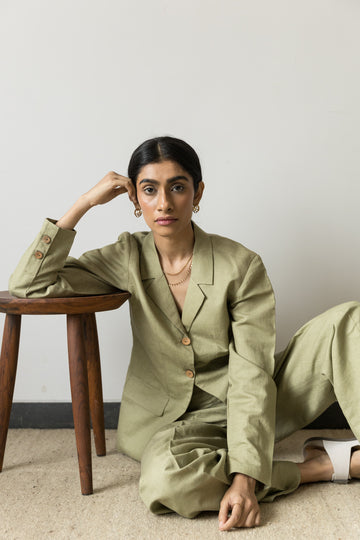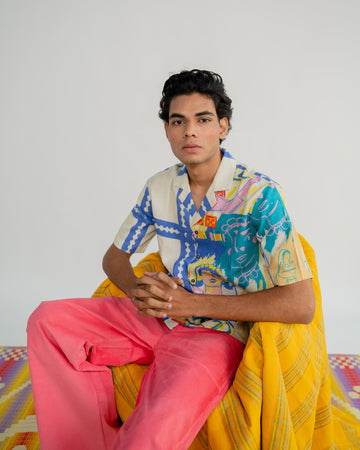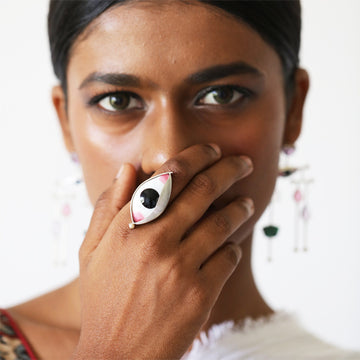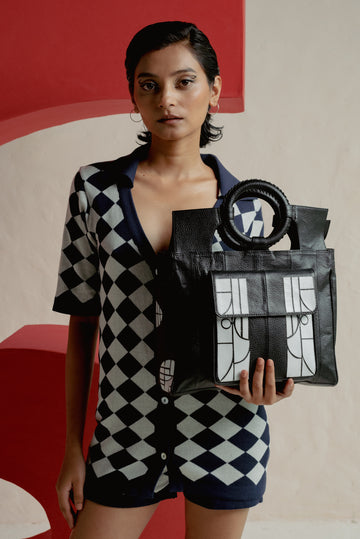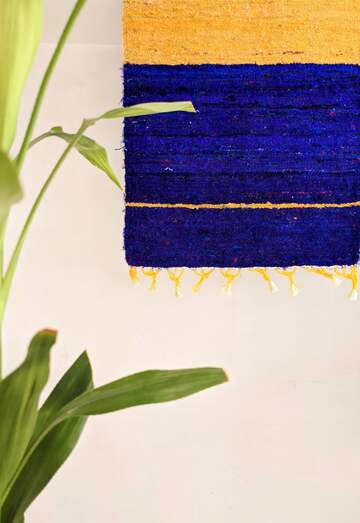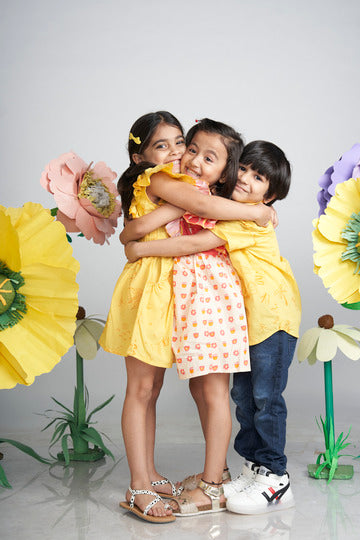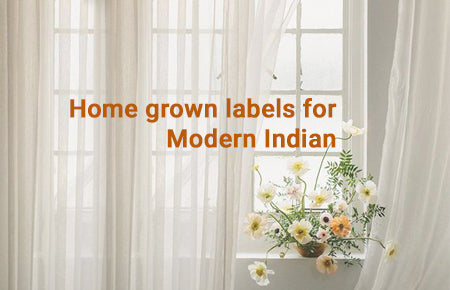With astoundingly dense forests, vast oceans, immense deserts, and oldest living eco-systems, EARTH – OUR HOME planet, is a world unlike any other.

But over the years what happened to this beautiful planet? From plastic in seas to air pollution and extinction of species, humans with their carefree attitude towards nature have destroyed most of its wilderness. Are the initiatives taken by the government and the United Nations enough to save the planet? Well, that’s indeed a question to ponder on.

A report revealed that the fashion industry consumed 79 billion cubic meters of water — enough to fill 32 million Olympic-size swimming pools. That figure is expected to increase by 50% by 2030. Did you know that it takes 2700 liters of water to make just one t-shirt; cotton crop needs more than 713 gallons of water to grow cotton for one t-shirt. And your favorite pair of jeans? Almost 10,000 liters of water go into creating them.

It is true that fashion revolves around trends but is the industry focusing on the need to radically alter the consumption patterns that are essential to ensure the survival of the planet? Do we need to produce more? Can’t we circulate all that is created among ourselves? Will it not aid the environmental crisis?
With millennials and the Z-generation becoming conscious consumers and sustainable fashion proponents, the global fashion industry is trying hard to create a more environmentally conscious fashion landscape and design a sustainable retail economy. It taps on production, re-use, and recycling of the products.

What is Pre-loved Fashion?
You open your wardrobe and find the shirt you haven’t worn in years. But its going to keep hanging in your wardrobe because either it is in good condition or you have memories in that shirt. That moment you choose to swap your old outfit with someone’s old outfit so that someone’s old becomes your new– that’s the concept of Pre-loved Fashion.

For many fashion brands and designers, this year has been the year of awakening. With high end fashion brands like Dior, Christian Louboutin and Prada believing in repeatwear, the pre- loved luxury fashion market has grown exponentially and helped consumers to be environmentally and morally responsible.
As per KD Market Insights research, the global pre-owned luxury goods market is expected to witness robust growth over the next five years to reach an estimated value of USD 52 Million in 2024. The global pre-owned luxury goods market is expected to expand at a CAGR of 12.0% in the terms of value during next 5 years. Resale apparel marketplace will be worth an estimated US$41 billion by 2020, with an expected 15% annual growth between 2017 and 2022.
With such a momentum growing globally, one wonders what is happening back home. As a country, Indians have an ingrained culture of swapping clothes with siblings and relatives. However, when it comes to buying pre-loved fashion, we tend to shy away. Blame it on social fabric and class elitism, noveou rich Indians want to spend on new and swanky rather than focus on environment and its concerns.
Kinjal Shah Desai, Communications Coordinator – CEPT University, is an active proponent of clothes swapping. Talking about her love for fashion and all things preloved, she elaborates “ I am the younger one in my family and for the longest time that I can remember, I have worn my brother’s jeans, or Baba’s tees and also worn my cousin sister-in-law’s dress. I also remember because I belong to a huge family, we always give the outfits to younger siblings or kids. I have happily taken them from my elders for both me and now even for my daughter. So yes, I do love pre-loved fashion. Having said that, I also buy new clothes, when I feel the need like or have a frustrated mind and opt for shopping instead of food. I also wear my husband’s jeans, after alteration or repairs.”

Kinjal Shah Desai in a green shirt swapped with Nisha Bhavin Shah
An avid supporter of pre-loved fashion since 2009, Labdhi Shah, Artist and Art Therapist, started practicing swaping on the new year’s eve as part of her new year resolution to live as a minimalist. Having travelled to multiple cities in India and abroad for studies and career, Labdhi shares on the ancient notion of swapping “I have been the only girl child in my family for five generations, so one can imagine the amount of pampering that would have gone to spoil my idea of “Pre-loved”. It was not until I moved to another city for my graduation and shared my room with people from different culture and countries that my inhibition and restrictions of wearing someone’s garment or so called- used garment went off.”

Understandable, because yes, we all share garments with siblings and friends but when it comes to a stranger, there is a certain dogma to it.
Ahmedabad has witnessed clothes swapping party happening as private events. Sustainability believer sister duo Renu Pokharna and Supriya Gupta hosted the first clothes swap party in December 2017. Advocates of pre-loved fashion, Kanan Dhru, Jolly Shah, Labdhi Shah and Kinjal Shah Desai have been a part of these clothes swapping parties since they started in the city.
Talking about how the swapping really started for her, Labdhi reminiscences“I have attended clothes- swap many times in Ahmedabad and continue to do so every six months. Thanks to Renu and Supriya for hosting the swap where it all finally started for me.I have been glad to have good female friends who believe in same phenomenon, and exchanging clothes with them is not merely for fashion or having different wardrobe. I love swap because of the stories my girlfriends have lived and cherished. It’s our way of sharing and being close.”
It started as an effort to stop buying new and embrace the old with stories. It didn’t just remain as “Hands-me-down” swap but it turned into a story telling session because each garment and its wearer had a story associated with it.
But the movement needs to spread on a larger scale.
What stops people to buy preloved items in India?
What could be the reason why people in India especially the rising urban middle class and luxury seekers do not opt for second hand/ pre-loved?
Jolly Shah – Former Emergency Specialist (UNICEF), also a preloved clothing endorser, comments “May be its a global stigma as they associate this with poverty and not having enough money and sometimes hygiene concerns. But I believe, it’s more of a mindset. It is not just about having enough disposable income. A high earning individual like myself doesn’t think of money but understands that it is about caring for environment. More so when we are facing climate change crisis. I ask myself if I really “need” to buy this or really need to use this plastic bag. There is too much of conspicuous consumption among this class and people often believe someone else will do something for the environment while they continue living their consumption-driven lifestyle unhindered. People also forget pre-loved goods is often the best of fashions and rarity too!”

Resonating with Jolly on social stigma attached with pre-loved buying, Kinjal adds “ “Kisi aur ki utran hum kyun pehne” is the generic response I have received when talking about preloved fashion. This needs to be shunned. I love new clothes, but if I like something from my friends or family’s closets, I happily take them if they don’t need it. I have no shame in saying or doing this.”
“There is an inherent need for women to be likeable and unique every time they dress up. This has resulted in a notion to avoid “preloved or swap” because LOG KYA KAHENGE if I wear a preloved item. With changing ecosystem globally, we have no choice but to be respectable to the nature which has nurtured us for the longest. If this new digital age has given us every opportunity to be aware, it would be foolishness not to exercise with wisdom” comments Labdhi on her thoughts of why people may not be buying preloved in India.
In a conscious effort to change the mindset of fashionistas of Ahmedabad from buying brand new to buying preloved fashion and thus adopting sustainable practice in their daily life, Ciceroni is hosting the very first Preloved Garage Sale in Gujarat on 29th June 2019 at Options Ahmedabad.

This will be the very first preloved sale happening in Gujarat to encourage people to opt for preloved fashion, a rising global trend in sustainable fashion.
On whether she had attended any such events in Gujarat or outside, Jolly shares“ I have attended Preloved sales abroad all the time especially at charity shops as they have amazing collections of clothes, shoes, jewellery, home decor items and ceramics which is often vintage and you cant to find it otherwise anywhere. I am yet to attend any in Ahmedabad ”
Fashion industry will never be completely socially responsible. It will never make a totally sustainable non-damaging product. But it is committed to trying. And we, as proponents of fashion and lifestyle, are committed to raising dialogues in right sustainable practices.
Embrace pre-loved fashion and play your part in making fashion truly circular. “Let your old clothes find a new home”

